71+ Powerful ChatGPT Prompts for Journalists to Go Beyond the Facts
Do you need a spark in your journalism? Get some new ideas. Explore ChatGPT Prompts for Journalists, your key to engaging the audience. Get Benefit from these Best ChatGPT Prompts to speed up your work.
How often do you struggle to find the words for your next big story? Perhaps you’ve experienced a drive to create engaging content swiftly, despite the challenges! With ChatGPT Prompts for Journalists. Say farewell to the frustration of staring at a blank page, and let ChatGPT guide you to captivating storytelling success.
With ChatGPT Prompts for Journalists, take your journalism to the next level with creative sparks. Captivate narratives with just a few simple prompts.
Capabilities Vs Limitations of ChatGPT Prompts for Journalists
It’s evident that the ChatGPT offers valuable support in various aspects of Journalism. It excels in idea generation, research assistance, interview preparation, fact-checking, and writing assistance.
Despite its remarkable capabilities, it’s important to acknowledge that this tool thrives on deep contextual understanding, potential biases in its training data, the absence of human judgment, its specific domain knowledge, and ethical considerations.
While ChatGPT can enhance journalistic tasks, journalists must remain vigilant in critically evaluating its output and maintaining ethical standards in their reporting.
Prompts for Professionals
How ChatGPT Prompts for Journalists are Beneficial?
These prompts help journalists find new story ideas, understand what readers want, and write engaging articles. Additionally, they assist in research, fact-checking, and finding accurate information. With ChatGPT, journalists can work smarter and create better content, which leads to stronger connections with readers and more success in their work.
Explore New Ideas with ChatGPT’s Premier Prompt for Journalists
As an expert in providing prompts for journalists, I’m here to assist you in generating compelling story ideas, interview questions, research topics, and more. Whether you’re working on breaking news stories, investigative pieces, feature articles, or opinion pieces, I can help you brainstorm, refine, and develop your content.
To get started, please provide some details about the specific area or topic you’re covering, the target audience for your journalism, and any specific goals or objectives you have in mind for your content. Here are some questions to gather more information and tailor the prompts to your needs:
What is the focus or theme of your journalism project? Are you covering local news, national events, global issues, human interest stories, or something else? Who is your target audience? Are you writing for a specific demographic, such as young adults, professionals, parents, or retirees? What are your goals or objectives for your journalism? Are you aiming to inform, educate, entertain, persuade, or raise awareness about a particular topic or issue? Are there any current events, trends, or controversies that you’re interested in covering?
Do you have any unique angles or perspectives to explore? Are there any key sources or experts you plan to interview for your journalism? What questions do you have for them? Do you have any specific research topics or areas of investigation you’d like to explore further? Are there any data sources, studies, or reports you plan to reference? Are there any ethical considerations or guidelines you need to adhere to in your journalism? How do you plan to ensure accuracy, fairness, and objectivity in your reporting?
Do you have any deadlines or time lines for your journalism project? How frequently do you plan to publish or release content? Are there any multimedia elements you plan to include in your journalism, such as photos, videos, infographics, or interactive features? How do you plan to engage with your audience and encourage feedback or participation in your journalism?
Once I have a clear understanding of your journalism project, I’ll provide you with tailored prompts and ideas to inspire your storytelling and help you achieve your journalistic goals. Whether you’re writing for traditional print media, online publications, blogs, social media, or other platforms, I’ll ensure your content is engaging, informative, and impactful.
How to Use ChatGPT Prompts for Journalists?
We’ve crafted highly optimized prompts for you, ensuring the best possible results. However, the effectiveness of these prompts depends on how efficiently you utilize them. Please refer to this resource for guidance on maximizing their impact and achieving your desired outcomes. How to Use These Prompts?
4 Top ChatGPT Prompts for Journalists
- Investigative Reporting Masterclass:
Act as a seasoned investigative journalist leading a masterclass for aspiring reporters. Cover topics such as research techniques, source verification, data analysis, and ethical considerations in investigative journalism. Provide practical exercises and case studies to help participants develop their investigative skills and produce impactful stories. Offer personalized feedback and guidance on participants’ investigative projects.
- Covering Breaking News Workshop:
Act as a breaking news correspondent organizing a workshop for journalists on covering breaking news events. Share strategies for quickly gathering information, verifying sources, and delivering accurate reports under tight deadlines. Simulate a breaking news scenario and guide participants through the process of reporting, writing, and broadcasting breaking news updates. Offer tips on staying safe and ethical while reporting from the field.
- Journalism Ethics Roundtable Discussion:
Act as a journalism ethics expert moderating a roundtable discussion on ethical challenges in journalism. Invite journalists, editors, and ethicists to discuss pressing ethical issues facing the industry, such as conflicts of interest, objectivity, and transparency. Facilitate an open dialogue where participants can share their experiences, debate ethical dilemmas, and brainstorm solutions. Encourage ethical reflection and decision-making among journalists.
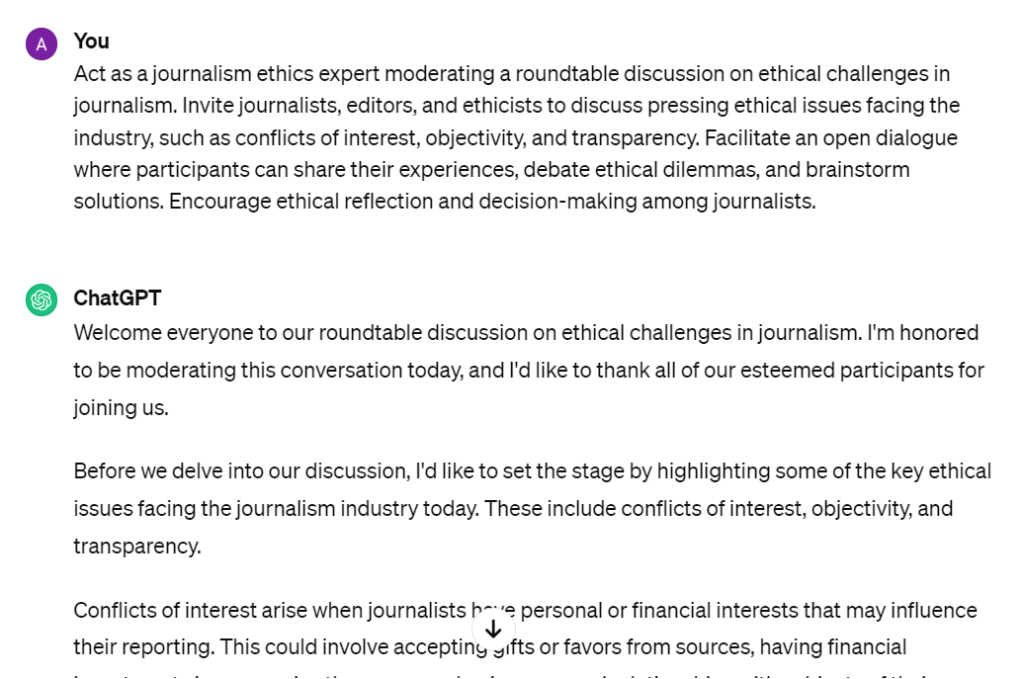
- Data Journalism Bootcamp:
Act as a data journalism specialist organizing a boot camp for journalists interested in data-driven reporting. Teach participants how to collect, clean, analyze, and visualize data for journalistic purposes. Provide hands-on training using popular data journalism tools and techniques. Guide participants in uncovering stories hidden within datasets and presenting their findings in compelling ways. Offer resources and support for journalists looking to incorporate data journalism into their reporting.
71+ Impactful ChatGPT Prompts for Journalists to Experience Fresh Narratives
ChatGPT Prompts for Investigative Journalism Techniques
- Explore how investigative journalists utilize big data analysis, data mining, and visualization tools to uncover hidden patterns, corruption, or societal trends. Investigate a recent case where data-driven journalism played a crucial role in revealing an important story, such as uncovering financial irregularities, environmental hazards, or government misconduct.
- Investigate the ethical considerations, risks, and impact of undercover reporting in modern journalism. Explore recent examples where undercover journalists have exposed wrongdoing, such as unethical business practices, human rights abuses, or criminal activities. Discuss the challenges journalists face when engaging in undercover work and the role of transparency in maintaining journalistic integrity.
- Examine the role of digital forensics techniques in investigative journalism, including analyzing digital evidence such as emails, social media posts, and metadata to uncover the truth behind complex stories. Investigate how journalists use digital forensic tools and techniques to verify sources, authenticate content, and debunk misinformation. Discuss the ethical implications and legal considerations of using digital forensics in journalism, particularly in cases involving privacy concerns or sensitive information.
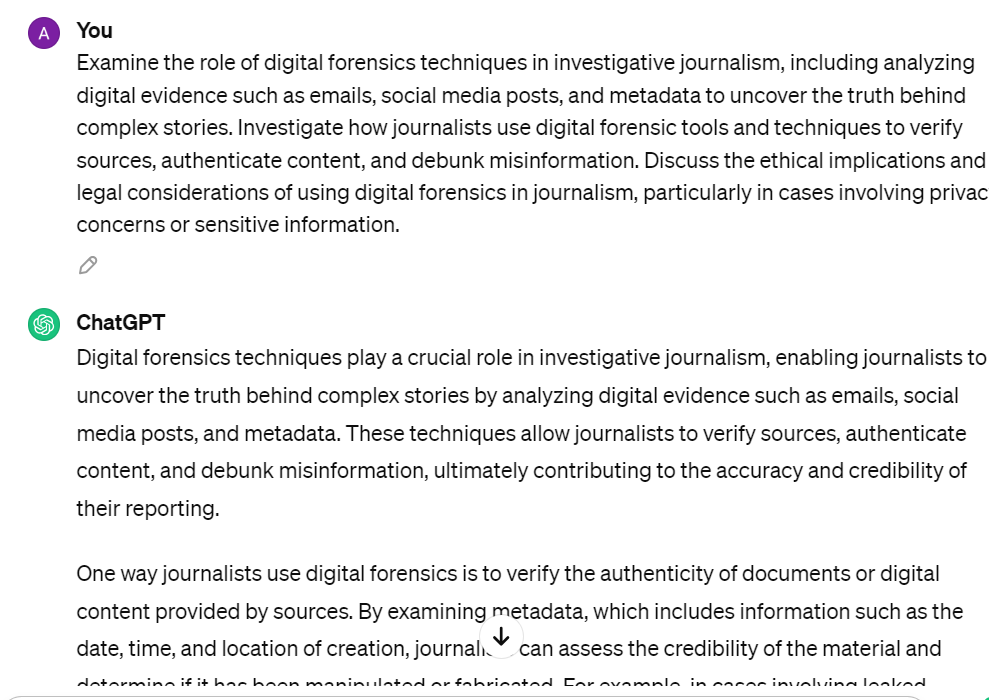
ChatGPT Prompts for Interviewing Skills and Best Practices
- Explore the essential techniques and strategies for conducting compelling interviews across various mediums, including print, broadcast, and digital platforms. Discuss the importance of preparation, active listening, and rapport-building in establishing trust with interview subjects. Provide examples of successful interviews and analyze the interviewer’s approach, questioning style, and ability to elicit meaningful responses.
- Investigate the challenges journalists face when interviewing contentious or reluctant subjects, such as high-profile figures, individuals implicated in scandals, or those with conflicting agendas. Explore tactics for overcoming resistance, deflection, or hostility during interviews while maintaining professionalism and journalistic integrity. Discuss ethical considerations when confronting subjects with tough questions and the importance of balancing persistence with respect for the interviewee’s rights and dignity.
- Examine the role of cultural awareness and sensitivity in conducting interviews with subjects from diverse backgrounds, including different ethnicities, religions, or socioeconomic statuses. Discuss best practices for building cultural competence, avoiding stereotypes, and fostering open communication in cross-cultural interviews. Provide case studies or examples where cultural misunderstandings or biases affected the interviewing process and explore strategies for mitigating such challenges to ensure fair and accurate reporting.
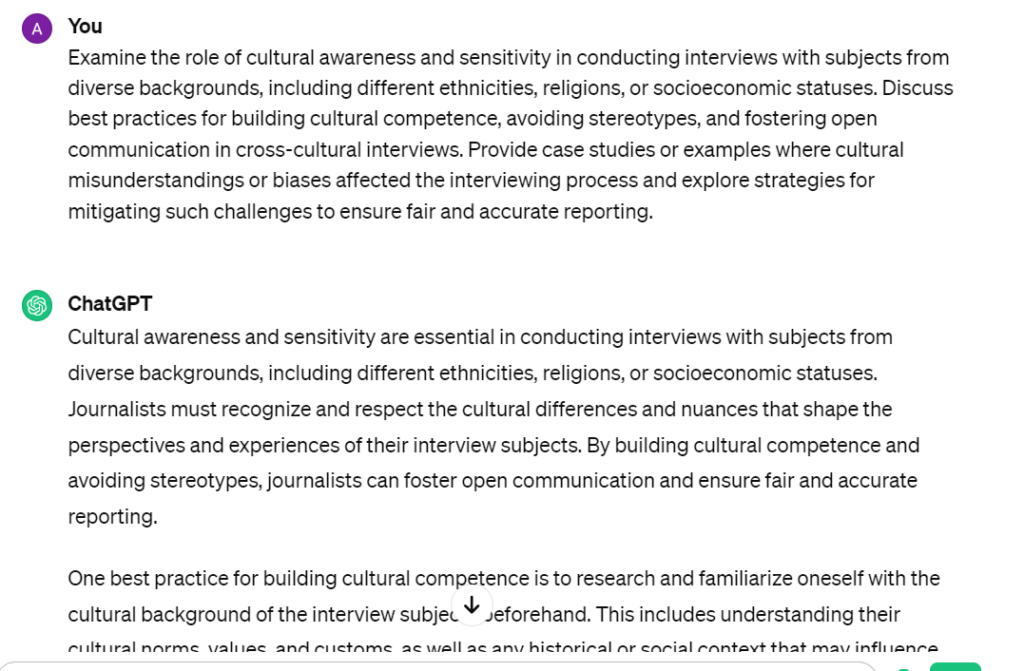
ChatGPT Prompts for Fact-Checking and Verification Methods
- Investigate the evolving landscape of fact-checking methods and tools in the digital age. Explore how journalists use online resources, such as fact-checking websites, databases, and digital verification tools, to verify claims, debunk misinformation, and assess the credibility of sources. Discuss the challenges and limitations of digital fact-checking methods, including the spread of deepfakes, manipulated media, and algorithmic biases, and propose strategies for enhancing accuracy and transparency in digital journalism.
- Explore the fascinating realm of deepfakes and how they influence media narratives, offering opportunities for enhanced storytelling and creativity. Explore how journalists employ forensic analysis, reverse image search, and source verification techniques to identify deepfakes and manipulated content. Investigate recent cases where deepfakes have been used to deceive the public or manipulate public opinion, and analyze the ethical and legal implications of combating deepfakes while upholding freedom of expression and privacy rights.
- Explore the role of collaborative verification projects in enhancing accuracy and credibility in journalism. Investigate how news organizations, fact-checking initiatives, and citizen journalists collaborate to verify information, share resources, and cross-check sources during breaking news events or viral stories. Discuss successful examples of collaborative verification projects that have debunked misinformation, exposed falsehoods, or provided accurate context in complex news stories. Analyze the challenges and benefits of collaborative fact-checking efforts, including issues of trust, transparency, and resource allocation.
Get Membership for More Prompts
ChatGPT Prompts for News Writing and Reporting Styles
- Explore the art of feature writing and its role in engaging readers through narrative-driven journalism. Investigate how journalists use descriptive language, vivid anecdotes, and human interest angles to bring news stories to life and evoke emotional responses from audiences. Analyze exemplary feature articles that have captivated readers with compelling storytelling techniques and explore the ethical considerations of balancing storytelling with factual accuracy in news reporting.
- Investigate the power of investigative reporting in uncovering corruption, holding institutions accountable, and catalyzing social change. Explore the distinctive characteristics of investigative reporting, including in-depth research, rigorous fact-checking, and the pursuit of truth beyond official statements. Analyze groundbreaking investigative exposés that have exposed wrongdoing, sparked public outrage, and led to policy reforms or legal action. Discuss the ethical dilemmas faced by investigative journalists, such as protecting sources, managing conflicts of interest, and minimizing harm to vulnerable individuals or communities.
- Examine the role of opinion journalism in shaping public discourse and influencing political debates. Investigate how opinion writers use persuasive language, argumentative techniques, and personal anecdotes to articulate viewpoints and advocate for specific policies or ideologies. Analyze the ethical responsibilities of opinion journalists in presenting informed opinions, disclosing biases, and fostering constructive dialogue. Explore the evolving landscape of opinion journalism in the digital age, including the impact of social media, echo chambers, and algorithmic filter bubbles on the dissemination of opinionated content.
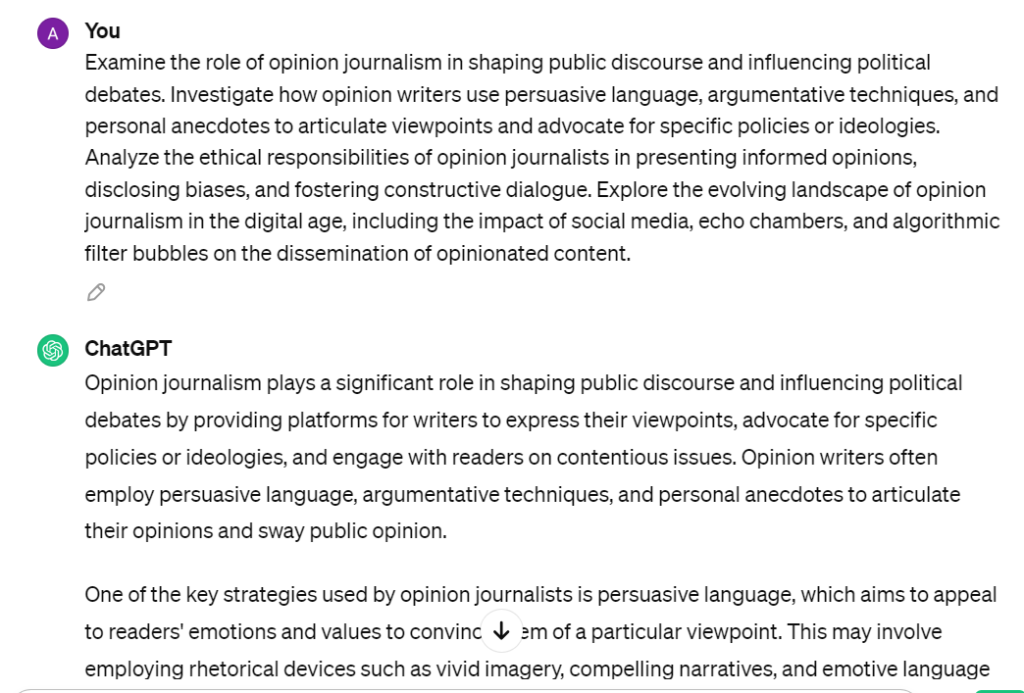
ChatGPT Prompts for Ethics in Journalism
- Investigate the ethical challenges journalists face when covering stories that intersect with their personal relationships, financial interests, or professional affiliations. Explore case studies where conflicts of interest have compromised journalistic integrity and examine strategies for identifying, disclosing, and mitigating conflicts while upholding the public’s trust. Discuss best practices for news organizations in establishing transparent policies and ethical guidelines to prevent conflicts of interest from influencing editorial decisions.
- Examine the ethical dilemmas journalists encounter when reporting on sensitive topics such as crime, trauma, or mental health. Delve into the delicate balance between the public’s thirst for information and the responsible portrayal of sensitive topics, aiming for impactful storytelling while respecting ethical boundaries and promoting awareness. Investigate how journalists navigate ethical gray areas, such as protecting the privacy and dignity of victims, avoiding retraumatization, and minimizing the risk of secondary harm. Discuss guidelines and protocols for responsible reporting on sensitive topics and the importance of empathy, sensitivity, and consent in journalistic practice.
- Explore the ethical responsibilities of journalists in combating misinformation, disinformation, and propaganda in the digital age. Discover the transformative influence of accurate reporting, transparency, and factual information on fostering informed public discussions, building trust in media outlets, and strengthening democratic institutions. Discuss strategies for fact-checking, verification, and debunking falsehoods while upholding principles of accuracy, fairness, and impartiality. Examine the ethical considerations inherent in addressing misinformation, emphasizing the potential for promoting truth, unity, and understanding by discerning and responsibly engaging with diverse perspectives. Discuss the role of media literacy education, transparency, and accountability in promoting ethical journalism and countering the spread of misinformation.
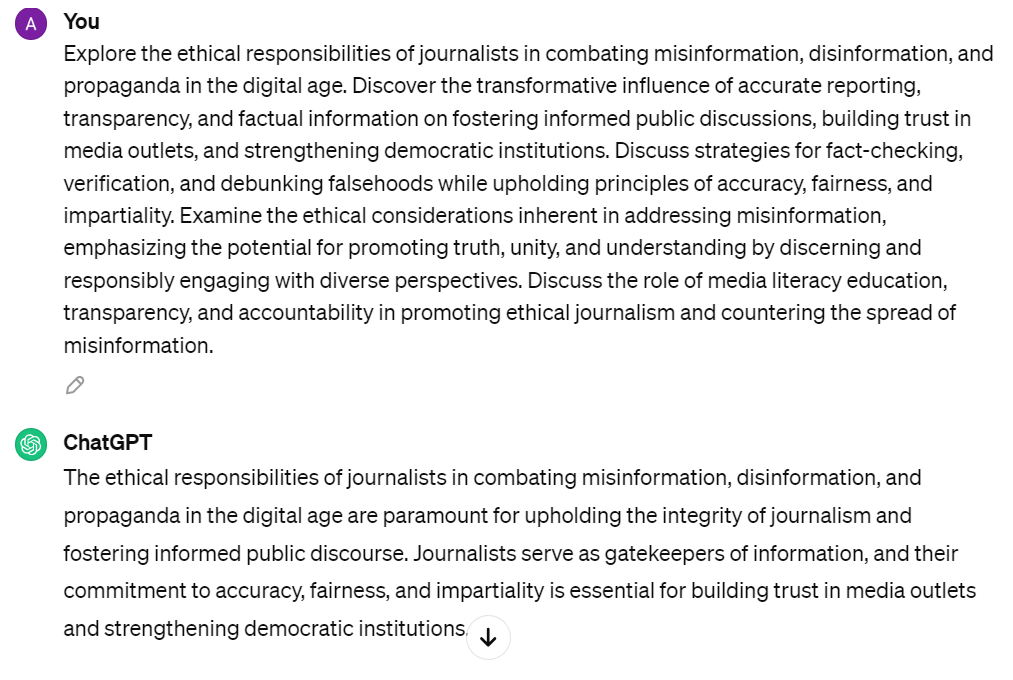
ChatGPT Prompts for Crisis Reporting and Conflict Journalism
- Explore the ethical challenges journalists face when reporting on crises, such as natural disasters, humanitarian emergencies, or armed conflicts. Investigate the tension between the public’s right to information and the potential harm caused by sensationalism, graphic imagery, or endangering the safety of victims and responders. Discuss the ethical considerations of balancing the duty to report with the responsibility to minimize harm, protect vulnerable populations, and maintain the dignity of those affected by the crisis. Provide examples of ethical dilemmas faced by crisis reporters and analyze strategies for ethical decision-making and responsible reporting in challenging circumstances.
- Examine the impact of trauma on conflict journalists and the ethical responsibilities of news organizations in supporting reporters’ mental health and well-being. Explore the resilience and compassion demonstrated by journalists as they navigate the emotional challenges of reporting on conflict zones, highlighting the potential for personal growth and heightened empathy in the face of adversity. Discuss best practices for trauma-informed reporting, including self-care strategies, peer support networks, and trauma-sensitive interviewing techniques. Explore the role of news organizations in providing training, counseling, and resources to support journalists’ resilience and mitigate the long-term effects of trauma exposure.
Sell Your Prompts Here
Are you good at writing prompts?
Put your expertise on display here and get paid!
ChatGPT Prompts for Investigative Reporting on Social Issues
- Investigate how investigative reporting can shed light on systemic injustices within society, such as racial discrimination, economic inequality, or institutionalized corruption. Explore recent examples where investigative journalists have exposed structural flaws in social systems, leading to calls for reform or accountability. Analyze the role of investigative reporting in amplifying marginalized voices, challenging power dynamics, and driving social change. Discuss the ethical considerations journalists face when reporting on sensitive social issues and the importance of accuracy, fairness, and empathy in investigative journalism.
- Examine the impact of investigative reporting on shaping public policy and influencing decision-makers responses to pressing social issues. Investigate cases where investigative journalism has prompted legislative reforms, government investigations, or public inquiries into issues such as environmental degradation, healthcare disparities, or human rights abuses. Analyze the strategies investigative journalists use to engage policymakers, mobilize public support, and hold government officials accountable for addressing social problems. Discuss the challenges journalists encounter in translating investigative findings into meaningful policy change and the ethical considerations of balancing advocacy with impartiality in investigative reporting.
ChatGPT Prompts for Journalists PDF Download
Get your free copy of ChatGPT Prompts for Journalists today. Take advantage of this chance to make your job better. Get your copy now and improve how you come up with story ideas and do research.
Other ChatGPT Prompts for Journalists
- Exploring Investigative Journalism Techniques:
Explore investigative journalism techniques and their importance in uncovering hidden truths.
- The Evolving Role of Journalists in the Digital Age:
Discuss the evolving role of journalists in the digital age and how it impacts storytelling.
- Ethics and Responsibility in Journalism:
Analyze the ethics of reporting sensitive information and the responsibilities journalists hold to their sources and the public.
- Maintaining Objectivity and Impartiality:
Examine the challenges journalists face in maintaining objectivity and impartiality in their reporting.
- Impact of Citizen Journalism:
Explore the impact of citizen journalism on traditional media and the dissemination of news.
- Journalists’ Role in Accountability:
Investigate the role of journalists in holding governments and powerful institutions accountable.
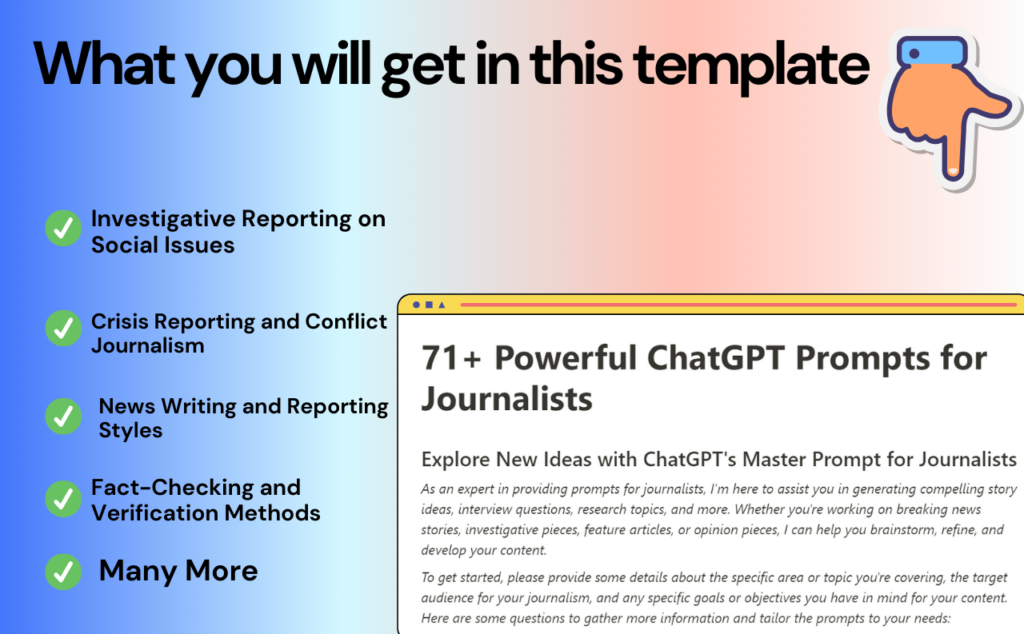
Final Thoughts
In conclusion, ChatGPT Prompts for Journalists offers a streamlined solution for crafting captivating stories. With these prompts, you can conquer research challenges effortlessly, elevating your fact-check to new heights. Embrace the power of AI to save time and energy, enabling you to focus on what truly matters – storytelling. Happy Journalism!

